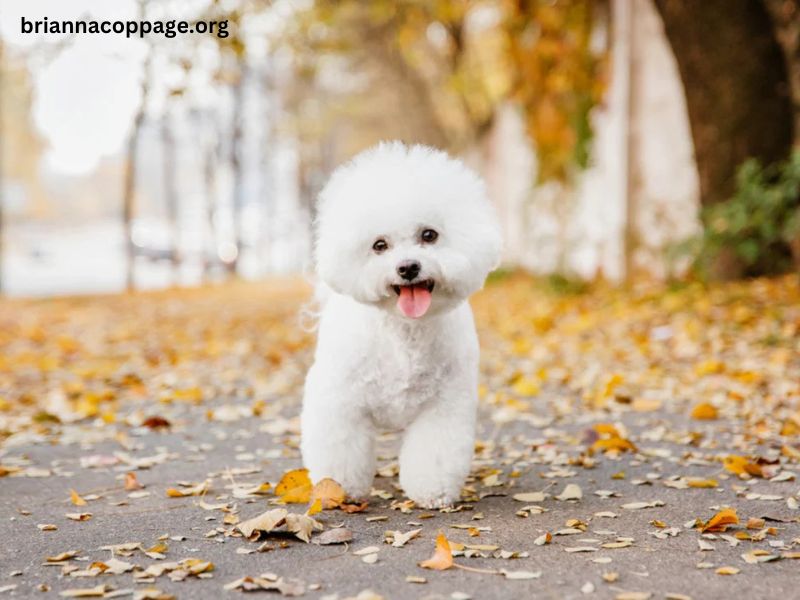Bichon Frise puppies are known for their playful, affectionate personalities and their love for companionship. As with any puppy, one of the key areas of concern for new pet owners is ensuring that the little furball is healthy and well-fed. One common issue that might arise in the first few months of owning a Bichon Frise puppy is a decrease in appetite, which can be concerning for new pet parents.
But is it normal for a Bichon Frise puppy to eat less than usual? The short answer is: it depends. While occasional changes in appetite can be part of your puppy’s normal growth and development, there are also various other factors—ranging from health issues to behavioral factors—that could affect your puppy’s eating habits. This article will explore some of the common reasons why a Bichon Frise puppy might eat less than usual, and what you, as an owner, can do to address these changes.
1. Normal Growth and Development Changes
Bichon Frise puppies, like all young dogs, go through different stages of growth, and their appetite can fluctuate during this time. As a puppy grows, its body demands nutrients in different amounts, and these changes can sometimes lead to brief periods of reduced appetite. Some common growth-related reasons for a decrease in appetite include:
Teething Phase
Teething is a major developmental milestone in puppies. Just like human babies, puppies experience discomfort as their baby teeth fall out and permanent teeth come in. This can lead to a temporary reduction in appetite. A Bichon Frise puppy may chew on things more often, but eating solid food might feel uncomfortable, especially if the gums are sore. If your puppy seems to eat less around the time they’re teething but is still playful and energetic, it’s likely a normal phase that will pass.
Growth Spurts
Puppies experience growth spurts, during which their bodies grow quickly and their energy needs change. A Bichon Frise puppy may eat more during growth spurts, but during periods of slower growth, they might eat a little less. These fluctuations are generally normal, and as long as your puppy’s weight and energy levels remain stable, there’s no need to worry.
Loss of Puppy Teeth
Around 3-6 months of age, a Bichon Frise puppy will begin to lose its deciduous (baby) teeth and grow in its permanent adult teeth. This can cause some discomfort, which may result in a reduced appetite. It’s not uncommon for puppies to eat less during this time, especially if they find it painful to chew dry kibble. Providing soft, moist food or using a dental chew toy to relieve some of the discomfort can help.
2. Health Issues That Could Cause Appetite Loss
A sudden or prolonged decrease in appetite is a potential indicator of a health problem. If your Bichon Frise puppy consistently refuses to eat or seems lethargic, it’s essential to rule out any medical conditions. Some of the common health issues that could affect appetite include:
Gastrointestinal Problems
Bichon Frises, like many small breeds, can be prone to gastrointestinal issues such as upset stomachs, vomiting, or diarrhea. If your puppy has recently eaten something they shouldn’t have, or if their food is not agreeing with them, they may eat less. Symptoms like vomiting, diarrhea, or bloating are clear signs that a trip to the vet is in order.
Parasitic Infections
Puppies are vulnerable to parasites such as worms, which can interfere with their digestion and overall health. These infections can cause nausea, vomiting, and a decreased appetite. If your puppy’s appetite loss is accompanied by other symptoms like weight loss, diarrhea, or lethargy, a vet visit is necessary for deworming treatment.
Dental Issues
Dental problems can also lead to a reduced appetite in puppies. Bichon Frises are not immune to dental issues, including tartar buildup, gum disease, or even tooth infections. If your puppy is reluctant to eat or seems to have trouble chewing, it could indicate a dental problem. A veterinary examination of their mouth is crucial to rule out oral health issues.
Upper Respiratory Infections
Respiratory infections or colds can make it hard for a puppy to smell and taste food, leading to a loss of appetite. If your puppy has symptoms like coughing, sneezing, or nasal discharge, they could be suffering from an upper respiratory infection. This type of infection can cause a temporary decrease in appetite but typically resolves with veterinary care.
Other Medical Conditions
Other underlying health issues, such as liver disease, kidney problems, or infections, can also cause a Bichon Frise puppy to eat less than usual. If the loss of appetite lasts for more than 24-48 hours or is accompanied by other concerning symptoms (e.g., lethargy, excessive thirst, or behavioral changes), you should seek veterinary care immediately.
3. Behavioral Factors That Could Impact Eating Habits
Not all appetite changes are due to medical issues. Sometimes, a puppy’s eating habits can be influenced by their environment, training, or socialization. Understanding these behavioral factors can help address your Bichon Frise puppy’s reduced appetite.
Stress or Anxiety
Like people, dogs can experience stress or anxiety, and it can significantly affect their appetite. Changes in the puppy’s routine, the arrival of a new pet, loud noises, or even changes in the home environment can cause anxiety in puppies. Stress can lead to appetite loss or a decrease in food consumption.
It’s essential to keep your puppy’s environment as calm and stable as possible. If there have been any recent changes in the home, consider giving your puppy extra attention, providing them with a quiet place to retreat, and using calming aids like pheromone diffusers or relaxing music to help them feel more secure.
Overfeeding or Spoiling
Some Bichon Frise owners may unintentionally spoil their puppies by offering too many treats or table scraps. When a puppy is regularly fed high-value treats outside of their regular meals, they may develop a preference for those foods, leading to a reduced interest in their regular puppy food. If you notice your puppy is eating fewer meals but will happily consume treats or scraps, it’s a sign that they may not be hungry enough for their regular meals. Try to limit treats and stick to a consistent feeding schedule to encourage a healthy appetite.
Picky Eaters
Bichon Frises, like many small breed dogs, can sometimes be finicky eaters. A Bichon Frise puppy may develop preferences for certain types of food or flavors. If you’ve been changing their food too frequently or giving them a variety of different foods, this can cause them to become more selective about what they eat.
To encourage healthy eating habits, it’s important to establish a consistent feeding routine and avoid constantly changing the food you offer. If your puppy is a picky eater, try offering different textures or flavors (such as wet food vs. dry food) to see what they prefer.
4. What Should You Do If Your Bichon Frise Puppy Eats Less Than Usual?
If your Bichon Frise puppy is eating less than usual, the first step is to assess the situation carefully. Consider the following:
1. Monitor Other Symptoms
Is your puppy displaying any other signs of illness, such as vomiting, diarrhea, lethargy, or coughing? If so, it’s time to consult your vet as soon as possible.
2. Check for Teething
If your puppy is around the age of 3 to 6 months, teething could be causing discomfort and reducing their appetite. Offer softer foods or teething toys to help alleviate discomfort.
3. Ensure a Consistent Routine
Stick to a regular feeding schedule, and avoid overfeeding with treats. Make sure that your puppy has a calm, secure environment and isn’t stressed.
4. Provide a High-Quality Diet
Ensure your puppy is getting a balanced, high-quality puppy food that meets their nutritional needs. Sometimes, a change in diet may be necessary to find a food that agrees with their digestive system.
5. Visit the Vet
If your puppy continues to eat less than usual for more than 48 hours or shows signs of illness, make an appointment with your vet. A health professional will be able to identify if there are any underlying medical issues and provide the appropriate treatment.
Conclusion
It’s normal for Bichon Frise puppies to occasionally eat less than usual as they go through phases of growth and development. However, it’s essential to monitor your puppy’s behavior and health closely. If appetite loss is prolonged or accompanied by other signs of illness, it’s important to seek veterinary advice. With the right care and attention, your Bichon Frise puppy will grow into a happy, healthy adult dog, and their eating habits will stabilize as they mature.






